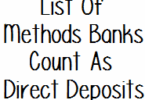One of the advantage of using a credit card is that if the goods or services aren’t delivered, you can issue a charge back with your card issuer and have the transaction refunded. The United States Court of Appeals
Tenth Circuit just decided an interesting case (really two cases: MALIK M. HASAN, M.D v CHASE BANK USA, N.A & MALIK M. HASAN, M.D v AMERICAN EXPRESS CENTURION
BANK). I’d recommend reading the case in full, but here’s my brief summary:
- Malik Hasan ordered wine from Premier Cru Fine Wines (Premier Cru) for future delivery.
- In January 2016, Premier Cru declared bankruptcy
- Premier Cru delivered some, but not all of the wine ordered. Malik Hasan had the following amounts undelivered:
- 689,176.92 with his Chase card
- $379,153.72 with his American Express card
- Malik Hasan filed a chargeback with both Chase & American Express. Chase agreed to credit and credited $100,136.88 and American Express refused to credit anything
- Malik Hasan filed a lawsuit seeking
- $589,040.04 from Chase
- $379,153.72 from American Express
The core of the case relates to Fair Credit Billing Act (an amendment to the Truth in Lending Act). Specifically section § 1666i (p9-10). Chase & American Express were able to successfully argue that because Malik Hasan had paid his balance, they weren’t required to honor the charge back.
On principal I disagree with the implications this decision has. Consumers shouldn’t be required to carry a credit card balance that usually incurs high fees and interest rates to have access to a consumer protection. In some cases it’s unreasonable to expect delivery of an item to be within a credit cards grace period, this would force a consumer to have to incur these fees to still be protected by a charge back.
Hat tip to View From The Wing






